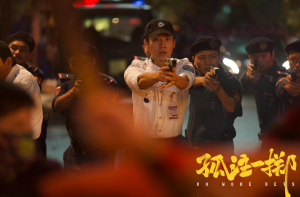Your columnist finally got around to watching the Chinese film “No More Bets,” a summer blockbuster in the mainland which one can find online, after some struggle, with English subtitles. It’s clearly a work of self-pity with a clear government PR message – try not to get conned by scammers – and it has managed to excite several Southeast Asian governments into banning its screening because of the apparent message that once you step foot outside China, or one foot inside Southeast Asia, it’s nothing but crime and anarchy.
Some ministers have even claimed that the film was to blame for a decrease in visiting Chinese tourists, but that ought to be doubted. The story is real to life. Lured overseas by supposedly high-paying jobs, some rather cliched Chinese characters are then put to work in a slave-like fraud factory, where depravity and violence ensue, in some unnamed Southeast Asian country. I believe it’s meant to be Thailand, although Khmer script is shown in the film, which is probably why Phnom Penh reacted by banning the ban, claiming that it “seriously damages Cambodia’s image and reputation.” More egregiously, perhaps, the film was presumably backed by the Cambodian government’s “ironclad” friends in Beijing: not only did the Chinese censors approve of the film, but they approved of it so much that it became a blockbuster, which cannot happen in China without some political backing.
Much of the attention surrounding this film, at least outside China, has been centered on this controversy. Even the South China Morning Post’s reviewer described it as a work of “histrionic scaremongering and xenophobia.” And, at its basest, “No More Bets” is a work of self-pity. Leave China, the message goes, and you enter the world of anarchy and barbarism. Yet, wait and the heroism of the Chinese police will rescue you. People better educated than myself on how the Chinese Communist Party thinks can say whether this fits into a philosophical view of domestic order and external chaos. It’s also a cautionary tale about making quick money, perhaps a slur on the get-rich mentality that Beijing has permitted for decades and which it seemingly now understands as leading to predatory capitalism. I’m told the film’s Chinese-language name translates as putting all your eggs in one basket.
But the film is a lot more intriguing than some are willing to permit. Take, for instance, as one reviewer put it, the case that while the two main victims lured into scamming “want to escape the scamming center, they’re also attracted – like all the kidnapped workers there – by the power they can hold over people online and by the opportunities for making money and eventually earning their freedom.”
In that respect, it does offer up a lot more nuance than you’ll find in most newspaper reports about Southeast Asia’s scam compounds, which tend to adopt our era’s proclivity to the oppressor-oppressed dialectic and assume that all the workers in these compounds are tricked into working there and only stay because of the serfdom imposed on them. In fact, as “No More Bets” alludes, perhaps unintentionally, the oppressed can also be oppressors.
But what’s most apparent in “No More Bets,” which can take you some time to realize, is the complete absence of Southeast Asia. We’re told that the events take place in Southeast Asia. But there are no Southeast Asians, at least except for the extras in the background of the shots and some signs in Khmer. Almost every character is Chinese. The victims are Chinese. The arch-criminal, Lu, is Chinese, as are the good-cop/bad-cop duo (whom I believe are played by actors from Hong Kong and Shanghai) who run the scam compound. The film was shot in Macau.
Thus, the film depicts the self-contained mini-Chinas of Southeast Asia, the “Chinese colonies” of Sihanoukville in Cambodia or Bokeo province in Laos, although, presumably, this was not the interpretation of Beijing’s censors. A witting viewer knows that China has exported its problems to Southeast Asia. At first, it was excess business; Chinese companies were running out of roads and apartments and bridges to build at home, so the Belt and Road Initiative allowed them to build endless infrastructure projects in Southeast Asia to absorb this “excess capacity.”
Then it was online gambling, providing the Chinese mafia better access to illicit funds and the Chinese elites more money-laundering options. But as hundreds of thousands of young Chinese men, who never left home before and certainly never went abroad, found themselves in places like Sihanoukville with ready money in their pockets and in countries where vice is easier to access, they behaved as young men do.
One struggles to call it an anti-imperial film – indeed, the heroics of the Chinese in solving all problems makes it somewhat pro-imperialist. But one obvious message is that the havoc wrought on parts of Southeast Asia by China is now being exported back home (and, indeed, the Chinese themselves are being exported to Southeast Asia to be both the exploiters and the exploited). Perhaps, then, at least subconsciously, is the idea that empire corrupts the imperialist, too.

































